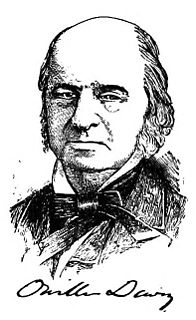A Quote by Lyndon B. Johnson
It is not uncommon for those who at their first entrance into the world were distinguished for attainments or abilities, to disappoint the hopes which they had raised, and to end in neglect and obscurity that life which they began in honour. To the long catalogue of the inconveniences of old age, which moral and satirical writers have so copiously displayed, may be often added the loss of fame.
Related Quotes
But how shall we excuse the supine inattention of the Pagan and philosophic world to those evidences which were presented by the hand of Omnipotence, not to their reason, but to their senses? During the age of Christ, of his apostles, and their first disciples, the doctrine which they preached was confirmed by innumerable prodigies. The lame walked, the blind saw, the sick were healed, the dead were raised, daemons were expelled, and the laws of Nature were frequently suspended for the benefit of the church.
Even in an advanced stage of civilization, there is always a tendency to prefer those parts of literature which favor ancient prejudices, rather than those which oppose them; and in cases where this tendency is very strong, the only effect of great learning will be to supply the materials which may corroborate old errors and confirm old superstitions. In our time such instances are not uncommon; and we frequently meet with men whose erudition ministers to their ignorance, and who, the more they read the less they know.
Money gained on Sabbath-day is a loss, I dare to say. No blessing can come with that which comes to us, on the devil's back, by our willful disobedience of God's law. The loss of health by neglect of rest, and the loss of soul by neglect of hearing the gospel, soon turn all seeming profit into real loss.
I intend to discuss some perplexing issues which are raised once we embrace the hypothesis that society can be deschooled; to search for criteria which may help us distinguish institutions which merit development because they support learning in a deschooled milieu; and to clarify those personal goals which would foster the advent of an Age of Leisure (schole) as opposed to an economy dominated by service industries.
What distinguished man from animals was the human capacity for symbolic thought, the capacity which was inseparable from the development of language in which words were not mere signals, but signifiers of something other than themselves. Yet the first symbols were animals. What distinguished men from animals was born of their relationship with them.
There are five dangerous faults which may affect a general: recklessness, which leads to destruction; cowardice, which leads to capture; a hasty temper, which can be provoked by insults; a delicacy of honour, which is sensitive to shame; over-solicitude for his men, which exposes him to worry and trouble.
Abstract systems depend on trust, yet they provide none of the moral rewards which can be obtained from personalised trust, or were often available in traditional settings from the moral frameworks within which everyday life was undertaken. Moreover, the wholesale penetration of abstract systems into daily life creates risks which the individual is not well placed to confront; high-consequence risks fall into this category. Greater interdependence, up to and including globally independent systems, means greater vulnerability when untoward events occur that affect those systems as a whole.
I am very willing to admit that I have some poetical abilities, and as few - if any - writers, either moral or political, are intimately acquainted with the classes of mankind among whom I have chiefly mingled, I may have seen men and manners in a different phasis from what is common, which may assist originality of thought.
Every man, however hopeless his pretensions may appear, has some project by which he hopes to rise to reputation; some art by which he imagines that the attention of the world will be attracted; some quality, good or bad, which discriminates him from the common herd of mortals, and by which others may be persuaded to love, or compelled to fear him.


































